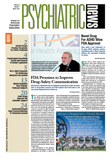The nation's need for trained professionals in addiction psychiatry is not being met, according to a prominent leader and educator in the field.
Psychiatrist Marc Galanter, M.D., said that a new survey of addiction fellowship programs across the country highlights the need for a renewed commitment to educating psychiatrists who specialize in the treatment of substance abuse and addiction disorders.
“Addiction is arguably the biggest public health problem that psychiatry confronts, but the psychiatry fellowship programs in no way meet this demand,” Galanter told Psychiatric News. “Most training programs don't have a subspecialty program in addiction, and those that do are not filling all the positions.”
A November 2006 survey of psychiatry training programs by the Center for Medical Fellowships in Alcoholism and Drug Abuse at New York University (NYU) revealed that 39 fellowship programs are active around the country with only 59 of 72 positions currently filled. Two programs that were active in 2004 are now inactive, and five have been closed down since then.
Galanter estimates that the field needs approximately 10 percent of psychiatric residents—or 100 residents a year—to enter addiction psychiatry fellowships.
The NYU center was established in 1987 and is sponsored by the American Academy of Addiction Psychiatry (AAAP), the Association for Medical Education and Research, and the American Society of Addiction Medicine. As part of the survey, all programs in addiction psychiatry accredited by the Accreditation Council for Graduate Medical Education (ACGME) were asked to complete a questionnaire about the history and current status of programs and activities of current and past fellows.
Galanter, a professor of psychiatry and director of the Division of Alcoholism and Drug Abuse at NYU School of Medicine, said a principal problem is the relatively meager salary received by PGY-5 fellows in addiction psychiatry: the survey found that the average salary was just $49,875.
With the level of debt that most trainees carry after residency, that salary is untenable for many who might otherwise be interested in a career in addiction psychiatry. “We need to have some way to allow people who are going into fellowships to get some loan forgiveness or have some options to supplement their incomes,” Galanter said.
Moreover, fellows in addiction psychiatry are typically providing a substantial amount of clinical care in a wide variety of programs. According to the survey, fellows spend on average 65 percent of their time in patient care.
“The majority of psychiatry training programs have not initiated addiction psychiatry PGY-5 fellowships, as there are often insufficient funds available for the allocation of protected time for fellowship training directors, and there is a demanding amount of record keeping and evaluation required of the fellowships,” he said. “This record keeping is equivalent to that required of the general residency programs, which have many more than the one or two fellows typical of the addiction programs.”
Galanter noted that the American Board of Psychiatry and Neurology, recognizing the public health importance of addiction, established added qualifications in addiction psychiatry and gave its first certifying exam in 1993.
“Over 1,400 psychiatrists were certified by 'grandfathering' over the first five years of the process,” he said. “Subsequently, certification could not be undertaken by a psychiatrist unless he or she had completed at least one year of a full-time fellowship in addiction psychiatry. This has led to the certification of only about 40 addiction psychiatrists every two years.
“In addition, many of the existing fellowship training positions are not filled,” he said. “Under these circumstances, when the grandfathered certified psychiatrists retire over time, there will be a material decline in the number of specialists in this important area.”
A few programs have proven more successful. Galanter said the fellowship program at NYU was among the first established in conjunction with the ACGME and has served as a model for many others.
“We admit three fellows each year for our PGY-5 program with an additional year of training on the junior-attending level supported by clinical funding,” he said. “This extended program allows for more extensive education in the clinical area while still assuring that each fellow carries out an independent research project for publication. Few programs, however, are in a position to offer similar opportunities, although some are supported in part by federal research training grants or VA budgets.”
Galanter said the AAAP has drafted a resolution now before APA's Council on Addiction Psychiatry underscoring the shortage of addiction psychiatrists and the failure of fellowship programs to meet the demand, as well as recommending steps to address the problem.
“APA is the only entity that has the national clout to formulate a solution to this so that we can produce a generation of specialists able to provide the leadership that is necessary and to teach the next generation of psychiatrists about addiction,” Galanter said.
“If it's not addressed, we are going to continue to have this limited level of psychiatric intervention in an important field,” he said.
A report on the NYU survey results on addiction psychiatry fellowships are posted at<www.med.nyu.edu/substanceabuse/assets/07FellowshipsWeb.pdf>.▪
